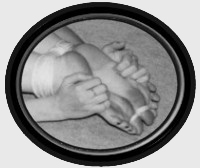-
The TMF is sponsored by Clips4sale - By supporting them, you're supporting us. -
>>> If you cannot get into your account email me at [email protected] <<<
Don't forget to include your username
You are using an out of date browser. It may not display this or other websites correctly.
You should upgrade or use an alternative browser.
You should upgrade or use an alternative browser.
this might interest some of you....
- Thread starter crydun
- Start date
featherfingers
1st Level Green Feather
- Joined
- Aug 18, 2004
- Messages
- 4,126
- Points
- 0
"It's a touch funny, but studies on tickling are serious"
By Usha lee McFarling
Mercury News Washington Bureau
December 1, 1998
Tickling. The notion puts a gleam in the eye of older brothers everywhere. And for the very ticklish, those who dissolve into jelly at a mere touch, the very word can inspire panic.
A handful of psychologists, like Rodney Dangerfields of science, are struggling to gain respect from their chuckling colleagues and they say that understanding the mysteries of the tickle may improve treatment for depression and even schizophrenia.
"Anything one said about tickling tends to be taken frivolously," said Alan J. Fridlund, a psychologist at the University of California-Santa Barbara who studies humor, facial expressions like smiles, and tickling. "But it's deadly serious."
Tickling may offer insight into the most fundamental of human bonds - an idea put forward by no less venerable a scientific figure than Charles Darwin. And William Shakespeare, who mastered all of our emotions, asked in "The Merchant of Venice," "if you tickle us, do we not laugh?"
"The notion that tickling is a quirky little behavior someone does to annoy you is false, said Robert Provine, an expert on laughter and a professor of psychology at the University of marland. "Tickle is the development of communication between mothers and babies. And its an important part of the vocabulary of lovemaking."
And as these scientists study tickling en route to loftier scientific understanding of the human brain and its role in social behavior, they're answering many pressing questions along the way.
For instance, why can't we tickle ourselves? Why do some people laugh when they're being tickled even though they call it torture? And is tickling a uniquely human trait?
The answer to the last question is no. "when you tickle the great apes they do their analog of laughter," said Provine, who in his research quest, has tickled our close relatives the chimps. "It's a panting sound."
Even baby rats squeal with pleasure when tickled, according to research presented this month at an annual conference of neuroscientists. "They're just like kids on a playground. They're shrieking and laughing," said Jaak Panksepp, a professor of psychology at Bowling Green State University in Ohio who conducted the studies and researches how the brain processes emotions, including joy.
Rat "laughter" wouldn't sound like laughter to you or me. In fact it wouldn't sound like anything at all, because most rat calls are at frequencies too high for human ears to detect.
Using a bat detector to listen in, Panksepp interprets the sounds as joy because they differ markedly from distress calls. The sounds rats make when being tickled by human hands or by the playful nips of litter mates are the same sounds a male makes while courting females.
Panksepp is trying to determine the brain chemicals that play a role in the pleasure and joy he sees in his rats. "If we found the chemistry of laughter, we might have new ideas on how to treat depression and sadness," he said.
Because tickling behavior appears to be universal among mammals, it may lie at the root of the complex social behavior of our species. Tickling is clearly social, said Provine, because it usually occurs only between people who know each other well.
"If a stranger did it, it would be a horrifying thing," Provine said. "It would be repellent." Tickling also appears to be social because we can't tickle ourselves.
(Why? A group of scientists at London's University College armed with a team of ticklish volunteers, a robot that tickles on command and machines that watch a brain during tickling -- say they know.
One finding showed that a person tickled by a robot had a very active somatosensory cortex, an area of the brain responsible for processing information about touch. People tickling themselves had less activity there, but showed more activity in the cerebellum, a brain region with duties that include tracking movement.
It's likely, the scientists surmise in the current issue of the journal of Nature neuroscience, that the cerebellum acts as a killjoy, squelching the tickling response if the tickling doesn't come from an outside source.
This mechanism could be what helps the brain sort through the confusing world of touch, pain and pleasure to censor out stimulation that's less important because it comes from our own bodies and not from some external threat, like a sharp tack or a rattlesnake.
Tickling research, if it helps clarify how the brain differentiates between self-produced and externally produced sensations, could also help schizophrenics, who have trouble making such distinctions, said Sarah Blakemore, the doctoral student who lead the brain-imaging study.
"When they move, they think another person or a machine is moving them," she said. "When they talk, they think they hear other voices."
Other scientists at Scotland's Stirling University this year suggested they had made a crucial advance by determining the most ticklish spot on the body. It is the right foot, particularly a small area right in the middle of the sole, they pronounced after tickling 34 volunteers with yet another type of tickling machine.
The right foot was more ticklish regardless of whether the volunteer (or victim) was right- or left-handed. Overall, though, right-handers were markedly more ticklish than left-handers in the studies by psychology student Jackie Smith.
The differences between right- and left-handers suggest that tickling may help illuminate how the brain processes pleasurable and painful emotions, functions that likely occur in separate regions of the brain.
While Smith cautioned that her studies involved too few people to be generalized to the ticklish world at large, her results suggested that men may be more ticklish than women -- and they are certainly far more likely than women to insist they are not ticklish at all.
Provine, in a survey of 481 people ages 8 to 86, also found that men are slightly more ticklish, and more likely to tickle, than women, but he cautioned that the differences were slight. It is clear that people of any age are far more likely to be tickled by the opposite sex, he said. People are so motivated to tickle they pay money to do so, he said, noting the popularity of the Christmastime doll sensation Tickle Me Elmo.
Which brings us to the question of why people laugh when being tickled even though they claim the attention is unwanted and torturous. Easy, said Fridlund, the expert on facial expressions from Santa Barbara. Laughing, he said, is not something we necessarily do when happy.
Laughing is actually quite a strange behavior. "We confuse our abdomens. Chortling noises come out. Tears come out of our eyes," he said, adding that the components of laughter all serve one purpose. They release tension.
Think of nervous laughter, he adds, and the strange laughing sounds people make while crying hysterically. Laughing at a comedian, he said, occurs after a punch line has released the tension caused by the suspense of the joke. And being tickled certainly causes the body to tense.
Humor evolves, said Fridlund, from a baby's giggling response to tickling to an ability to laugh at funny faces and silly gestures and then to jokes, subtle wit and irony. It all starts, though, with the first tickle. "Without tickling," he said, "there might not be any humor at all."
By Usha lee McFarling
Mercury News Washington Bureau
December 1, 1998
Tickling. The notion puts a gleam in the eye of older brothers everywhere. And for the very ticklish, those who dissolve into jelly at a mere touch, the very word can inspire panic.
A handful of psychologists, like Rodney Dangerfields of science, are struggling to gain respect from their chuckling colleagues and they say that understanding the mysteries of the tickle may improve treatment for depression and even schizophrenia.
"Anything one said about tickling tends to be taken frivolously," said Alan J. Fridlund, a psychologist at the University of California-Santa Barbara who studies humor, facial expressions like smiles, and tickling. "But it's deadly serious."
Tickling may offer insight into the most fundamental of human bonds - an idea put forward by no less venerable a scientific figure than Charles Darwin. And William Shakespeare, who mastered all of our emotions, asked in "The Merchant of Venice," "if you tickle us, do we not laugh?"
"The notion that tickling is a quirky little behavior someone does to annoy you is false, said Robert Provine, an expert on laughter and a professor of psychology at the University of marland. "Tickle is the development of communication between mothers and babies. And its an important part of the vocabulary of lovemaking."
And as these scientists study tickling en route to loftier scientific understanding of the human brain and its role in social behavior, they're answering many pressing questions along the way.
For instance, why can't we tickle ourselves? Why do some people laugh when they're being tickled even though they call it torture? And is tickling a uniquely human trait?
The answer to the last question is no. "when you tickle the great apes they do their analog of laughter," said Provine, who in his research quest, has tickled our close relatives the chimps. "It's a panting sound."
Even baby rats squeal with pleasure when tickled, according to research presented this month at an annual conference of neuroscientists. "They're just like kids on a playground. They're shrieking and laughing," said Jaak Panksepp, a professor of psychology at Bowling Green State University in Ohio who conducted the studies and researches how the brain processes emotions, including joy.
Rat "laughter" wouldn't sound like laughter to you or me. In fact it wouldn't sound like anything at all, because most rat calls are at frequencies too high for human ears to detect.
Using a bat detector to listen in, Panksepp interprets the sounds as joy because they differ markedly from distress calls. The sounds rats make when being tickled by human hands or by the playful nips of litter mates are the same sounds a male makes while courting females.
Panksepp is trying to determine the brain chemicals that play a role in the pleasure and joy he sees in his rats. "If we found the chemistry of laughter, we might have new ideas on how to treat depression and sadness," he said.
Because tickling behavior appears to be universal among mammals, it may lie at the root of the complex social behavior of our species. Tickling is clearly social, said Provine, because it usually occurs only between people who know each other well.
"If a stranger did it, it would be a horrifying thing," Provine said. "It would be repellent." Tickling also appears to be social because we can't tickle ourselves.
(Why? A group of scientists at London's University College armed with a team of ticklish volunteers, a robot that tickles on command and machines that watch a brain during tickling -- say they know.
One finding showed that a person tickled by a robot had a very active somatosensory cortex, an area of the brain responsible for processing information about touch. People tickling themselves had less activity there, but showed more activity in the cerebellum, a brain region with duties that include tracking movement.
It's likely, the scientists surmise in the current issue of the journal of Nature neuroscience, that the cerebellum acts as a killjoy, squelching the tickling response if the tickling doesn't come from an outside source.
This mechanism could be what helps the brain sort through the confusing world of touch, pain and pleasure to censor out stimulation that's less important because it comes from our own bodies and not from some external threat, like a sharp tack or a rattlesnake.
Tickling research, if it helps clarify how the brain differentiates between self-produced and externally produced sensations, could also help schizophrenics, who have trouble making such distinctions, said Sarah Blakemore, the doctoral student who lead the brain-imaging study.
"When they move, they think another person or a machine is moving them," she said. "When they talk, they think they hear other voices."
Other scientists at Scotland's Stirling University this year suggested they had made a crucial advance by determining the most ticklish spot on the body. It is the right foot, particularly a small area right in the middle of the sole, they pronounced after tickling 34 volunteers with yet another type of tickling machine.
The right foot was more ticklish regardless of whether the volunteer (or victim) was right- or left-handed. Overall, though, right-handers were markedly more ticklish than left-handers in the studies by psychology student Jackie Smith.
The differences between right- and left-handers suggest that tickling may help illuminate how the brain processes pleasurable and painful emotions, functions that likely occur in separate regions of the brain.
While Smith cautioned that her studies involved too few people to be generalized to the ticklish world at large, her results suggested that men may be more ticklish than women -- and they are certainly far more likely than women to insist they are not ticklish at all.
Provine, in a survey of 481 people ages 8 to 86, also found that men are slightly more ticklish, and more likely to tickle, than women, but he cautioned that the differences were slight. It is clear that people of any age are far more likely to be tickled by the opposite sex, he said. People are so motivated to tickle they pay money to do so, he said, noting the popularity of the Christmastime doll sensation Tickle Me Elmo.
Which brings us to the question of why people laugh when being tickled even though they claim the attention is unwanted and torturous. Easy, said Fridlund, the expert on facial expressions from Santa Barbara. Laughing, he said, is not something we necessarily do when happy.
Laughing is actually quite a strange behavior. "We confuse our abdomens. Chortling noises come out. Tears come out of our eyes," he said, adding that the components of laughter all serve one purpose. They release tension.
Think of nervous laughter, he adds, and the strange laughing sounds people make while crying hysterically. Laughing at a comedian, he said, occurs after a punch line has released the tension caused by the suspense of the joke. And being tickled certainly causes the body to tense.
Humor evolves, said Fridlund, from a baby's giggling response to tickling to an ability to laugh at funny faces and silly gestures and then to jokes, subtle wit and irony. It all starts, though, with the first tickle. "Without tickling," he said, "there might not be any humor at all."
milagros317
Verified
- Joined
- Jan 12, 2002
- Messages
- 579,585
- Points
- 63
Very interesting article.
Robert Provine has written a book entitled "Laughter: A Scientific Investigation":
http://www.amazon.com/Laughter-Scientific-Investigation-Robert-Provine/dp/0670893757
It has one chapter on tickling.
Robert Provine has written a book entitled "Laughter: A Scientific Investigation":
http://www.amazon.com/Laughter-Scientific-Investigation-Robert-Provine/dp/0670893757
It has one chapter on tickling.
What's New
Our Welcome forum has a place for you to introduce yourself. Say hello!
NEST 2024
Streaming Videos
Congratulations to *** brad1701 *** The winner of our weekly Trivia,
held every Sunday night at 11PM EST in our Chat Room













